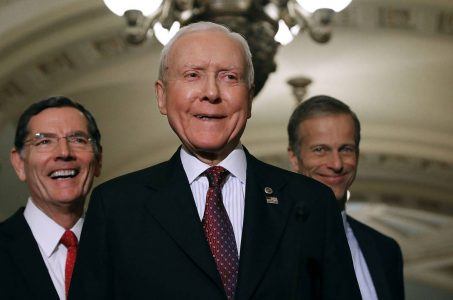Federal Sports Betting Bill Surfaces in Congress, Proposes Official League Data Mandate
Posted on: December 5, 2018, 07:45h.
Last updated on: December 5, 2018, 07:24h.
A draft of Senator Orin Hatch’s (R-Utah) threatened federal sports betting bill appeared on Capitol Hill Tuesday.

The bill seeks to provide a uniform federal framework of sports betting regulation and would require states seeking to legalize sports gambling operations to have their rules signed off by the US Attorney General’ office. The AG would have 180 days to either approve or veto applications.
The bill asserts that Congress must play an important role in “setting minimum standards” for sports wagering — standards that include mandating the use of paid-for official league data by operators, which is likely to be music to the ears of league commissioners Goodell, Silver, Manfred, et al.
No states that have thus far regulated sports betting have made official league data compulsory, which is largely why the leagues have been arguing — and lobbying — for a federal framework.
Wire Act Would Be Amended
The bill also calls for the establishment of the National Sports Wagering Clearinghouse, which would monitor the markets for suspicious betting patterns by collecting anonymized data in real-time.
As well as addressing advertising and problem gambling, the bill would amend the Wire Act of 1961 to allow sportsbook operators to lay off bets to other states.
This is a good thing for operators as it will reduce their exposure to local bias — where bettors within one state are more likely to bet on the local team, which poses a problem for operators if the local teams keep winning. The Wire Act specifically forbids intrastate wagering, but the proposed amendment would allow bookmakers to hedge bets with other states and keep odds on local teams competitive.
Commandeering Issues?
Hatch was one of the authors of PASPA, the 1992 federal bill that prohibited state-sanctioned sports betting which was overturned by the US Supreme Court last May, paving the way for state-by-state regulation.
The Utah Republican has said state regulation will allow sports betting to “proliferate amid uneven enforcement” and called it “a patchwork race to the regulatory bottom.”
But most states and operators argue that federal oversight is unnecessary — and there could be further constitutional issues. Marc Edelman, a law professor at Baruch College in New York, tweeted on Tuesday that, although he had not read the language of the bill, “giving the federal government power to approve or disapprove states’ sports gambling laws could give rise to the exact same commandeering problem.”
The bill also fails to address whether the eight states that have already regulated sports betting would be forced to subject to Hatch’s rules.
Related News Articles
Most Popular
Mirage Las Vegas Demolition to Start Next Week, Atrium a Goner
Where All the Mirage Relics Will Go
Most Commented
-
Bally’s Facing Five Months of Daily Demolition for Chicago Casino
— June 18, 2024 — 12 Comments
















No comments yet